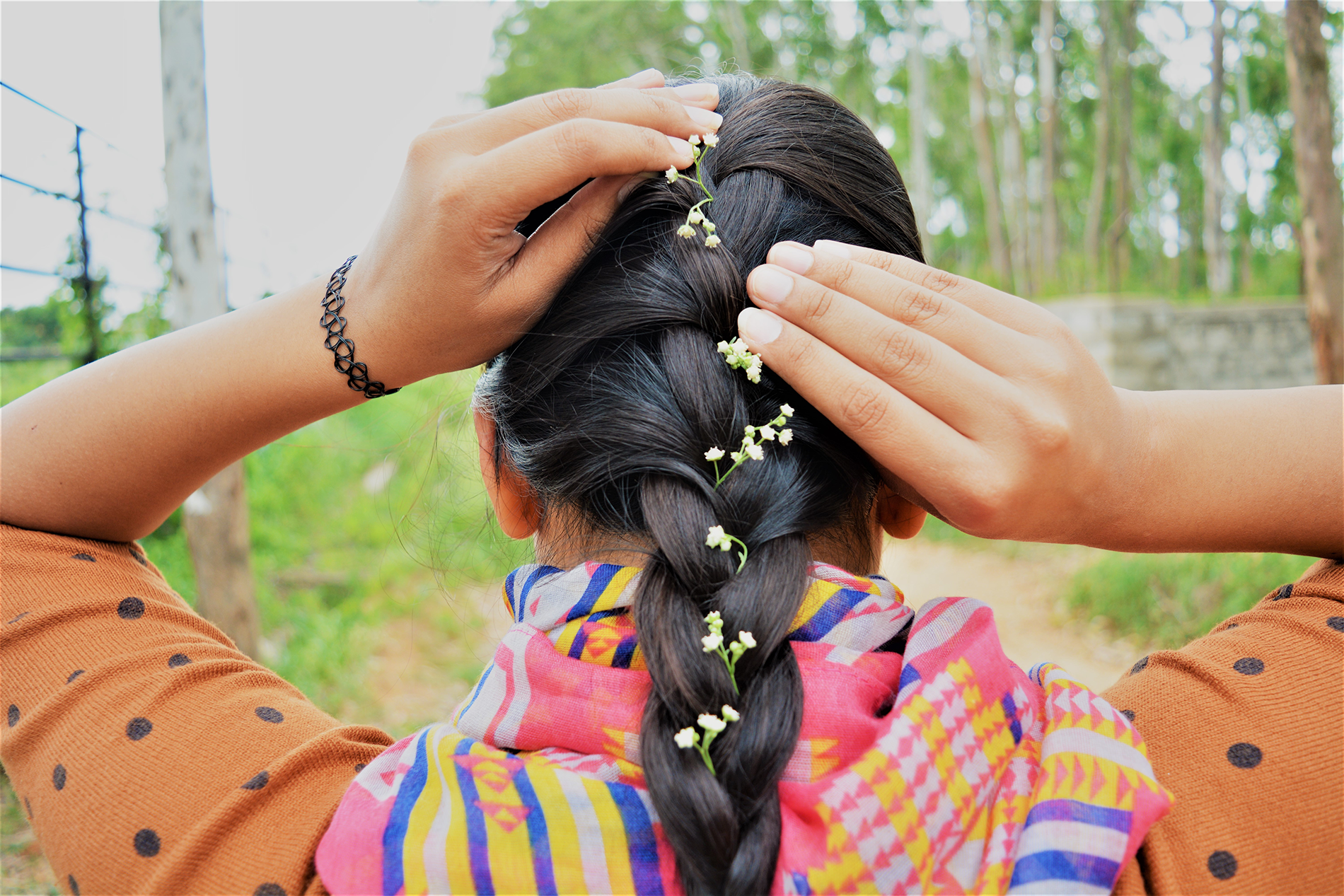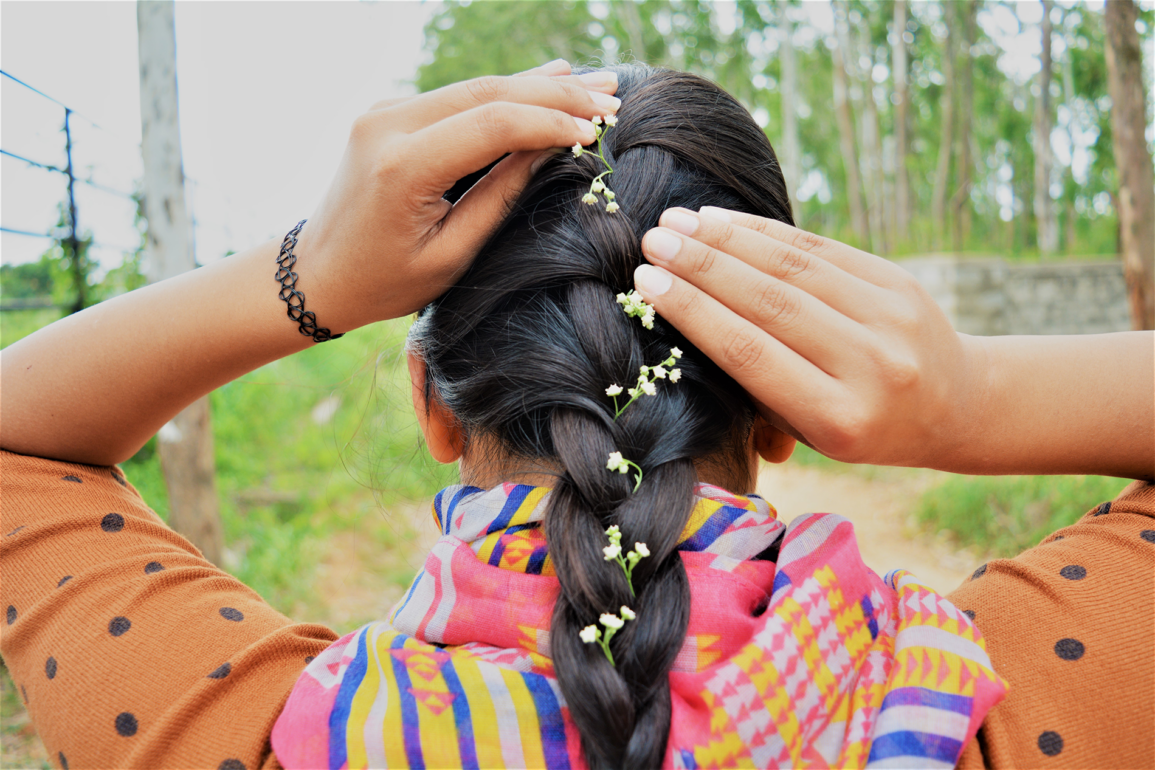
Beckoning Ben to sit, Asha quickly explained that Padma had been told to stop wearing her hair in a braid and to “neatly groom” her hair into a “professional hairstyle” under the Banner personal appearance policy. Ben shook his head sympathetically.
Asha looked at her laptop, opened it to Banner’s website. “So, let’s see what ‘neatly groomed’ and ‘professional hairstyles’ mean at Banner.” Clicking on the links to social media, Asha began to scroll.
“Here’s Talia.” Padma pointed to a young woman standing at a table draped in Banner’s blue logo: “Banner Team Wins Walk for Charity!” Ben read aloud the photo’s caption and quipped: “How does a company win a charity walk, exactly?”
Asha grabbed his arm and said: “Look at her hair! She is the assistant who was at the meeting with Padma today!” “It’s neatly cut, but if hair dyed a neon shade of yellow is considered professional enough to be on display in social media and the human resources office, then why does an ordinary black-haired braid violate the policy?” Joining as a team now, Asha threw her hands up in the air to punctuate Ben’s question, before turning again to their neighbor, encouraging her to eat as they talked.
“There are two problems with this, Padma—problems for Banner, that is. Arguably, the appearance policy is not being uniformly applied to all employees. That’s a breach of the implied contract Banner created with its employees in making the ‘appearance policy’ part of the employment relationship.”
Ben asked if they were sure that such a policy exists outside the memo Cynthia gave Padma. Padma pointed to the employment policies bar on the side of the webpage, and Asha navigated to the appearance policy; the memo had accurately quoted from it.
“OK, but what makes your braid not ‘neat’ or ‘professional’ while Talia’s hairstyle is implicitly made an example for you by having her at today’s meeting? This brings us to the second problem.”
“Have your dinner, honey,” Ben said to Asha, making Padma apologize for the intrusion.
“Yeah, eat your dinner, Mom!” Maya teased, having entered the kitchen unnoticed.
Now it was Asha’s turn to apologize. “Maya, sweetie, can you please give us some privacy?”
“It’s fine, really!” interjected Padma. Despite this assurance, Maya’s presence framed the kitchen scene with Padma’s regret and envy.
Before they grew apart on their own, Padma had slowly inched Beti away from her childhood friend, Maya, wary of the American girl’s bubbly freedom that her daughter could not safely imitate. Now, she wished she had helped Beti be more like Maya: comfortable in her own home, in her own life.
As Maya served herself a second helping of chili while humming along to a song slightly audible through her earbuds, Asha ate a few bites from her own bowl. Ben asked: “Asha can explain this better, but are you familiar with equal employment opportunity laws, Padma?”
In her supervisory role as a senior claims adjuster, Padma had completed trainings on workplace discrimination and harassment, watching videos and answering questions on the Banner “zero tolerance” policies and the Banner complaint procedures.
“Putting aside harassment for now and focusing on discrimination, an employer like Banner cannot intentionally treat employees less favorably because of their race, color, national origin,” Padma added, “or gender.”
“Or religion,” Asha said, dabbing her mouth with a napkin.
“Sorry, I forgot to tell you what Cynthia asked me.” Padma shared Cynthia’s question about whether the braid had religious significance and Padma’s response. Asha gasped.
“Wasn’t she just trying to find out whether she needed to provide a reasonable accommodation?” Ben asked.
Asha began explaining that employers can ask such a question in assessing an employee’s request for accommodation, but in this context, Cynthia’s question was improper. Asha interrupted herself, her eyes widening as she put a napkin to her mouth once again.
“Tell me about your braid, Padma. Why is it important to you? I will explain in a moment.” Ben shifted in the kitchen barstool and listened intently, relieved that he had stopped himself from suggesting that Padma try a new hairstyle to resolve the conflict.
Padma explained that the braid she had worn for most of her life was in keeping with veni, an Indian tradition of braiding hair. “Veni means ‘braided hair,’ actually.” Padma gently pulled her braid over her shoulder. This morning, she had braided her hair reflexively, unaware of its significance.
“To me, like many Indian women, the braid holds great meaning. If a woman stops wearing her hair in a braid, it is a sign of grief or discontent.”
Looking at Maya’s chestnut brown waves, so much like Ben’s, Asha grew quiet, thinking of the battle she waged with her mother who insisted on sending her to school with a long braid, even though she kept her own hair in a chin-length bob.
On her first day of seventh grade, wanting desperately to match her friends’ hairstyles, Asha had woken early and piled her hair on top of her head, wrapping it with a borrowed neon pink scrunchie. Mom had silently served her breakfast, Asha remembered, and the childhood ritual that had drawn them close each morning was lost.
Asha’s heart ached from that memory; her mother’s pain was now laid bare too late.
“So, your braid is a part of your—our—ethnicity, right?” Instinctively, Ben put his arm around Asha’s shoulders as Padma nodded wearily.
Envisioning herself in a courtroom drama, Padma’s resolve was slipping away, just as Asha’s eyes shined with renewed fervor.
“If your employer is subjecting you to disparate—or different—–treatment because of your ethnic hairstyle, then you may have a claim for national origin discrimination.” On Asha’s laptop, the Banner Insurance’s social media images gently rolled in a slideshow. “Wait, is that you, Padma?” Asha asked, pausing an image of several Indian women seated at a table, some wearing their hair in a single braid like Padma.
Nodding again, Padma added: “These are my friends from the IT—information technology—department.”
The photo was taken at the Fitness Fun event, soon after Cynthia had grown impatient waiting to be served by the friendly woman running the organic juice booth who had complimented Padma’s “authentic hairstyle” and chatted with Padma about her travels around India. Padma was about to confide this, but she was distracted by her buzzing cellphone.
Asha continued: “Even if forbidding you to wear your hair in a braid is not based on discriminatory bias, Indian women who work at Banner are still more negatively impacted by Cynthia’s application of the personal appearance policy than other ethnicities.”
Ben clapped his hand on the island like he was hitting a drum. “Yes—disparate impact.”
Startled into attention, Padma found herself asking a question. “What about this. Cynthia said I must be good at computers, or better at computers then she is.”
It was Asha’s turn to play drums on the kitchen island. Neither Asha nor Ben looked at Padma; they kept their knowing glances between themselves.
Ben explained that Cynthia’s comment could manifest a discriminatory bias because it seems based on an ethnic stereotype. Shaking his head, Ben quietly added: “She would likely claim that she was just referring to her own ineptitude with computers compared to everyone else.” After a moment, Asha sighed and said: “It could be called a ‘microaggression’—we know what she meant; it’s hurtful, but if isolated, it does not in itself hold much legal weight.”
“I am sorry,” Asha whispered. Padma knew that Asha was offering sympathy from her own wounds.
Despite the deep warmth being extended to her, Padma shivered as if a blanket had been pulled off her. Her problem could be analyzed here but not resolved. In tomorrow’s daylight, the safety of this kitchen would evaporate, and she would have to return to work.
Stepping gingerly off the kitchen island stool and quietly placing her bowl next to the sink, Padma apologized for wasting their time. “I don’t want to lose my job. I don’t want to sue Banner.”
In unison, Ben and Asha protested. “You won’t have to file a complaint. Banner won’t let it come to that.”
“Let me write a letter to Cynthia, explaining our position.” Asha was now standing, and talking fast, but she stopped herself before delivering a lecture on the state and federal employment discrimination complaint processes that leaned heavily toward resolution.
“I know you have to go, so I won’t keep you. But I just want to tell you that last month, I attended a seminar on recent changes to California employment law. There is a new law called the CROWN Act that specifically protects against hair discrimination. I will research it and raise it in the letter.”
Ben turned in his seat and added with a comforting smile: “Believe me, Cynthia does not want her boss to know that she apparently missed the training on this new law. You have power here.”
“And I am sure Cynthia will know that Banner cannot retaliate against you for asserting your rights to be protected against illegal discrimination by your employer.”
Padma thanked them and awkwardly accepted Asha’s hug and offer of leftovers. As Ben filled a glass container with chili, Padma flattened the memo with her hand. “I am going to wear my hair in a bun tomorrow.” Padma gently raised her hand and tilted her head to the side, blocking a counterargument, a gesture that echoed deeply within Asha.
“Can I at least draft an email for you to send to Cynthia tomorrow?” Asha pleaded. “Let me keep the memo; I can scan it for you. You don’t have to sign anything. If Cynthia asks you for a signed memo, tell her your attorney will be in touch.”
Handing Padma the chili container, Ben quipped: “Tell her if she wants to see the memo again, she will have to learn how to download an email attachment.”
“Oh, and of course, Padma and I can help her with that because we are ‘good at computers’!” Asha sarcastically asserted, gesturing with quotation marks. The two women laughed together, each with their own momentary relief.
After Padma left, having gratefully accepted Asha’s assurance that she was happy to draft the email message for Padma’s signature, Maya entered the kitchen to help her parents wash the dishes as they discussed the CROWN Act. “Oh, are you talking about the natural hair movement?”
Maya quickly dried her hands and deftly opened a social media page on her cellphone. Photos of Black women wearing their hair in braids, twists and other hairstyles appeared, along with a video of a woman describing how she had lost her job because of her braided hair, which she described as part of her racial heritage.
This post was originally published on this site be sure to check out more of their content.









